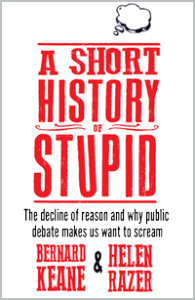A Short History of Stupid
by Bernard Keane & Helen Razer
Published by Allen & Unwin www.allenandunwin.com
Having recommended two books together a little while ago, I now find myself in the oddly karmic position of recommending half a book. Specifically I’d like to recommend chapters 2, 4, 6, 8, 10 and one appendix of ‘A Short History of Stupid’ by Bernard Keane and Helen Razer – a catalogue of forehead slappingly dumb decisions made by individuals and institutions. In truth it’s more harangue than history but engagingly so. At least Keane’s chapters are. Razer is… hmm…let’s say, an acquired taste.
Near the start she laments that she can’t kick the habit formed by an early editorial instruction to ‘put more of herself on the page’. She should try. Her heart is in the right place and she is occasionally funny but she writes like an X-rated radio shock jock and comes across as a parental-advisory-warning Ophra guest who’s personal tirades against L’Oreal adverts, ‘safe space yoga’ and Jason Russell are peppered with single entrendres and short anglo saxon words. Don’t let her dock-hand prose put you off this book though.
If Razer is examining Stupid through her own personal microscope then Keane is using a wide angle lens. Conversely, for all that he rages against Stupid as much as Razer, his is a far less haphazardly belligerent, more tightly focused antagonism. Reading like an Aussie amalgam of Noam Chomsky and Christopher Hitchens, Keane lays into the big fish of Stupid with chapters covering climate change denial, extreme paternalism and terrorism. As a political columnist he is particularly vituperative about the systematic misuse of statistics (originally termed ‘political arithmetic’ – you can see why they changed it) to confound public debate on everything from alcoholism to economic policy.
That’s not to say he goes easy on the other targets though. He is outraged that spending a trillion dollars on the ‘War on Terror’ has had the sole effect (according to US and British Intelligence) of making the overall terrorism problem worse. He is weary of ‘security theatre’ policies (usually expensive) that give the impression of increased security without adding significantly to it. He laments ‘historic ignorance’ as each new generation of “reckless, drug-abusing youth” become concerned parents of tomorrow demanding that “something must be done about gin/video games/heavy metal/waltzing/reading the Old Testament”. Seriously; the Waltz was fit only for ‘prostitutes and adulteresses’ – adulterers presumably didn’t dance – and Henry VIII banned the Bible to protect the ‘youth of the realm’.
While the book has a definite international flavour there are some specifically antipodean references – which is at least different from the usual American ones – but they are intelligible enough for the most part. I’m not sure about the ‘reverse magic pudding’ metaphor Keane uses but the Aussie examples of the misuse of science and numbers in news and politics travel well.
Why is Stupid so successful he asks? There’s money of course. As example, Keane quotes Upton Sinclair’s “it’s hard to get a man to understand something when his salary depends on not understanding it”. There’s also the preservation of constitutional power, the adherents of which, (unlike financial Stupid) are often true believers. So much so that security chiefs react with genuine horror at the thought of people accessing “unfettered ideas… in their lounge rooms” (that’s certainly where I keep my unfettered ideas). Mostly though Keane thinks we simply lack the mental tools to identify and counteract Stupid. We’re good at tribalism and groupthink not evidence and logic. We see challenge as a personal attack because we tie our arguments to our ego.
As to what to do about that… Keane and Razer robustly inform us that we’re on our own there. Hopefully though, the inoculation ‘A Short History of Stupid’ provides will prime our intellectual immune systems against future afflictions.
